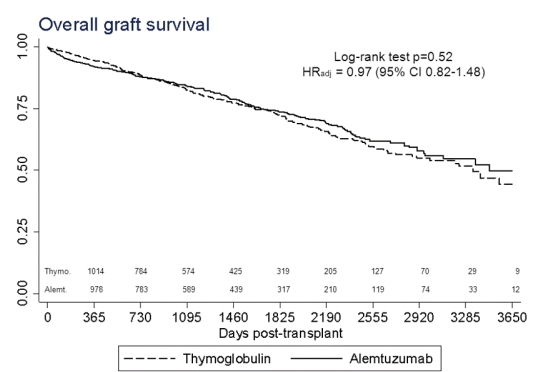Outcomes of Depleting Antibody Induction in Kidney Transplantation: A Paired Kidney Analysis.
Nephrology and Hypertension, Allegheny General Hospital, Pittsburgh, PA.
Meeting: 2016 American Transplant Congress
Abstract number: 520
Keywords: Graft survival, Induction therapy
Session Information
Session Name: Concurrent Session: Kidney: Induction Therapy 2
Session Type: Concurrent Session
Date: Tuesday, June 14, 2016
Session Time: 4:30pm-6:00pm
 Presentation Time: 5:06pm-5:18pm
Presentation Time: 5:06pm-5:18pm
Location: Room 312
Induction therapy can improve graft survival following kidney transplantation. Organ quality, a major determinant of graft outcomes may act as a confounder in comparative studies of transplant outcomes. In order to eliminate donor related confounding, we compared outcomes of depleting antibody induction with Thymoglobulin vs. alemtuzumab in deceased donor kidney transplant recipients (DDKTRs) utilizing paired kidney analysis.
OPTN/UNOS data, as of June 2015, was used to identify first time adult DDKTRs in the United States from 2003 to 2013 who were discharged on tacrolimus/mycophenolic acid maintenance. The cohort was then limited to recipients of transplanted kidneys from same donor, one induced with Thymoglobulin and the other with alemtuzumab. A Cox regression analysis adjusting for multiple recipient and transplant related confounders was used to calculate rejection-free graft, overall graft, and patient survivals.
Cohort was limited to 2,298 patients. When compared to alemtuzumab group, Thymoglobulin group had more African Americans, higher prevalence of peripheral vascular disease, hepatitis B sero-positivity, panel reactive antibody titers >30% and steroid maintenance on transplant discharge (98 vs. 89%, p<0.001). Perfusion pump use, cold ischemia time and delayed graft function were similar between the groups. Transplant length of stay was longer in Thymoglobulin group (6 vs. 5 days, p<0.001). Adjusted hazard ratios with 95% confidence intervals for rejection-free graft, overall graft (fig 1) and patient survivals were 0.97(0.87-1.07), 0.97(0.82-1.48), and 0.86(0.69-1.05), respectively. Subgroup analysis by steroid use was limited by unequal distribution between groups, with only 20 recipients in Thymoglobulin/no steroid group. No overall graft survival differences were observed between alemtuzumab/steroid; alemtuzumab /no steroid and Thymoglobulin/steroid groups.

Conclusion: Our study showed similar graft and patient outcomes between Thymoglobulin and alemtuzumab induction in DDKTRs maintained on tacrolimus/Mycophenolic acid. Correcting donor factors with a paired-kidney analysis model adds to the strength of the findings.
CITATION INFORMATION: Sampaio M, Chopra B, Sureshkumar K. Outcomes of Depleting Antibody Induction in Kidney Transplantation: A Paired Kidney Analysis. Am J Transplant. 2016;16 (suppl 3).
To cite this abstract in AMA style:
Sampaio M, Chopra B, Sureshkumar K. Outcomes of Depleting Antibody Induction in Kidney Transplantation: A Paired Kidney Analysis. [abstract]. Am J Transplant. 2016; 16 (suppl 3). https://atcmeetingabstracts.com/abstract/outcomes-of-depleting-antibody-induction-in-kidney-transplantation-a-paired-kidney-analysis/. Accessed March 4, 2026.« Back to 2016 American Transplant Congress
